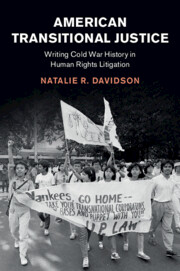
-
Select format
-
- Publisher:
- Cambridge University Press
- Publication date:
- 04 June 2020
- 02 July 2020
- ISBN:
- 9781108774529
- 9781108477703
- 9781108702553
- Dimensions:
- (228 x 152 mm)
- Weight & Pages:
- 0.46kg, 220 Pages
- Dimensions:
- (229 x 152 mm)
- Weight & Pages:
- 0.302kg, 220 Pages
You may already have access via personal or institutional login
Book description
Natalie Davidson offers an alternative account of Alien Tort Statute litigation by revisiting the field's two seminal cases, Filártiga (filed 1979) and Marcos (filed 1986), lawsuits ostensibly concerned with torture in Paraguay and the Philippines, respectively. Combining legal analysis, archival research and ethnographic methods, this book reveals how these cases operated as transitional justice mechanisms, performing the transition of the United States and its allies out of the Cold War order. It shows that US courts produced a whitewashed history of US involvement in repression in the Western bloc, while in Paraguay and the Philippines the distance from US courts allowed for a more critical narration of the lawsuits and their underlying violence as symptomatic of structural injustice. By exposing the political meanings of these legal landmarks for three societies, Davidson sheds light on the blend of hegemonic and emancipatory implications of international human rights litigation in US courts.
Reviews
‘In this excellent and timely book, Davidson pushes the study of transitional justice away from its familiar focus on criminal proceedings and truth commissions towards a richer reckoning with the full range of legal mechanisms through which a politics of emancipation can be pursued. No less distinctively and originally, Davidson brings into sharp relief how legal actors pursuing rather local goals can nevertheless powerfully advance the larger interests of justice.'
Lawrence Douglas - Amherst College, Massachusetts
‘Davidson's extensive on-the-ground research sheds new light on the achievements, limitations and perverse ways in which human rights litigation in the U.S. plays out. She brings a critical perspective that is nuanced and sophisticated, drawing from current work in human rights, anthropology, discourse studies as well as law.'
Naomi Roht-Arriaza - University of California, Hastings Law
‘To what extent has America been held accountable for its conduct abroad during the Cold War? Read this book for an insightful interdisciplinary inquiry into the pursuit of justice through human rights litigation.'
Ruti Teitel - Ernst C. Stiefel Professor of Comparative Law, New York Law School
Contents
Metrics
Altmetric attention score
Full text views
Full text views help Loading metrics...
Loading metrics...
* Views captured on Cambridge Core between #date#. This data will be updated every 24 hours.
Usage data cannot currently be displayed.
Accessibility standard: Unknown
Why this information is here
This section outlines the accessibility features of this content - including support for screen readers, full keyboard navigation and high-contrast display options. This may not be relevant for you.
Accessibility Information
Accessibility compliance for the PDF of this book is currently unknown and may be updated in the future.


